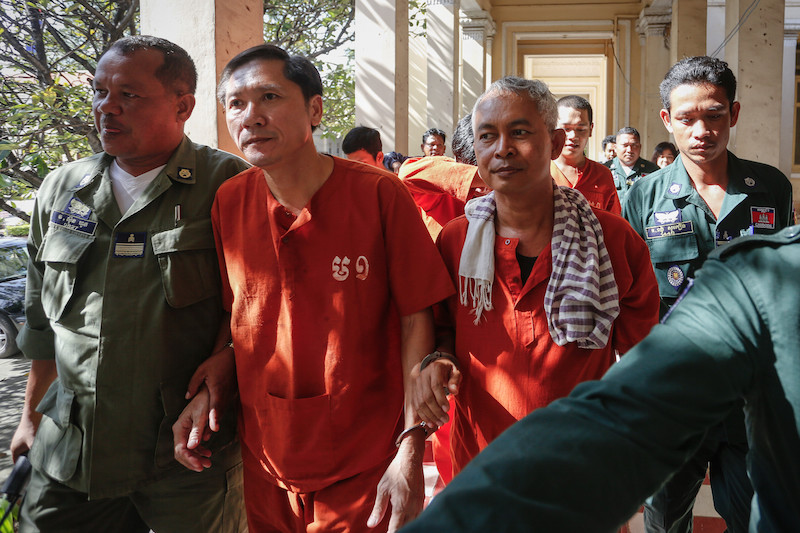By the time 2017 arrived, four human rights officers and an election official jailed in relation to a case involving acting CNRP President Kem Sokha were supposed to be free—or at least that was the message from the opposition party after talks with the CPP on December 7.
But with the calendar turning on Saturday night, the five prisoners—Lim Mony, Nay Vanda, Ny Sokha and Yi Soksan of local rights group Adhoc, along with senior election official Ny Chariya—finished off their 247th day behind bars with no sign of freedom.

Kem Monovithya, deputy public affairs director for the CNRP, tweeted after the meeting between Mr. Sokha—her father—and Prime Minister Hun Sen that the five would be free “before the end of this month.” She declined to explain what had changed when contacted on Sunday.
Opposition leader Sam Rainsy, who is living in exile in Paris, referred questions about the missed deadlines to his colleagues in Phnom Penh. But he said the efforts to release the five had been stalled by Mr. Hun Sen.
Mr. Rainsy said the prime minister had sent messages to Mr. Sokha after their talks three weeks ago asking him to take a public stance against his fellow opposition leader, or condemn his continued criticism of the government despite a supposed political detente.
“Kem Sokha refused, and he sent a message to Kem Sokha saying if you don’t do what I ask, I will do nothing for the release of those you are referring to,” Mr. Rainsy said by telephone.
He dismissed concerns from some observers that his provocative statements made over social media and the radio—notably a promise to “crush” those in the CPP who did not respect a potential CNRP victory in next year’s national election—have prevented Mr. Sokha from securing concessions from the ruling party.
“This is the beauty of our strategy,” he said, explaining that party leaders in Cambodia could pursue a dialogue with the ruling party while he spoke honestly about the situation from outside, having been officially banned from returning to the country.
“I don’t feel compelled to be compliant. I am free,” he said.
CNRP spokesman Yim Sovann said he had no update on efforts to secure the release of the human rights officers and election official, and that he was not aware of any plans for another meeting between Mr. Sokha and CPP leaders. He added that he could not confirm Mr. Rainsy’s account.
“Because sometimes he has discussions with the acting president [Mr. Sokha], so he has more information than me,” Mr. Sovann said. “If the words are from Sam Rainsy, please quote him.”
CPP spokesman Sok Eysan said he did not believe that Mr. Hun Sen would try to use the prisoners as leverage to split the opposition.
“It is the culture of Sam Rainsy since the beginning, saying something untrue,” he said. “Now, he runs out of options, and so he has become more irresponsible, and has a mental problem because he runs out of rights and privileges—like sailing a raft in the middle of an ocean.”
Thida Khus, a human rights advocate and NGO director who was initially summoned for questioning along with the five prisoners, said Mr. Rainsy’s provocative commentary was not helping the situation.
“I think it would be helpful if he learned how to speak more peacefully and positively,” she said, suggesting he focus more on helping the people and less about beating Mr. Hun Sen. “How do you expect the CPP to respond?”
Ms. Khus said Adhoc was also weary of being beholden to political negotiations, and had backed away from a plan to have their officers released along with Seang Chet, an opposition commune chief set free on December 8, as they did not want to be “lumped together” with the CNRP.
While political factors were certainly at play, Ms. Khus said the government was also happy to have the case continue to serve as a warning to other human rights groups.
“They want to hold civil society hostage because they want to tell NGOs not to criticize…and be verbal about something,” she said.
Adhoc spokesman Soum Chankea could not be reached on Sunday.
Political analyst Ou Virak said the CNRP had put itself in a difficult position, having set an expectation that it could not deliver on.
“They are gonna be stuck,” he said of the CNRP’s efforts to secure the release of the prisoners, who were jailed for allegedly bribing a mistress of Mr. Sokha to deny an affair. “There is nothing they can do.”
But with the international community continuing to apply pressure on the government—the U.N. declared last month that the detention of the five was arbitrary—he said the CPP might eventually cave anyhow.
“The CPP also faces pressure,” he said. “Because of that, I think the government will try to find a way out.”
(Additional reporting by Kang Sothear)



